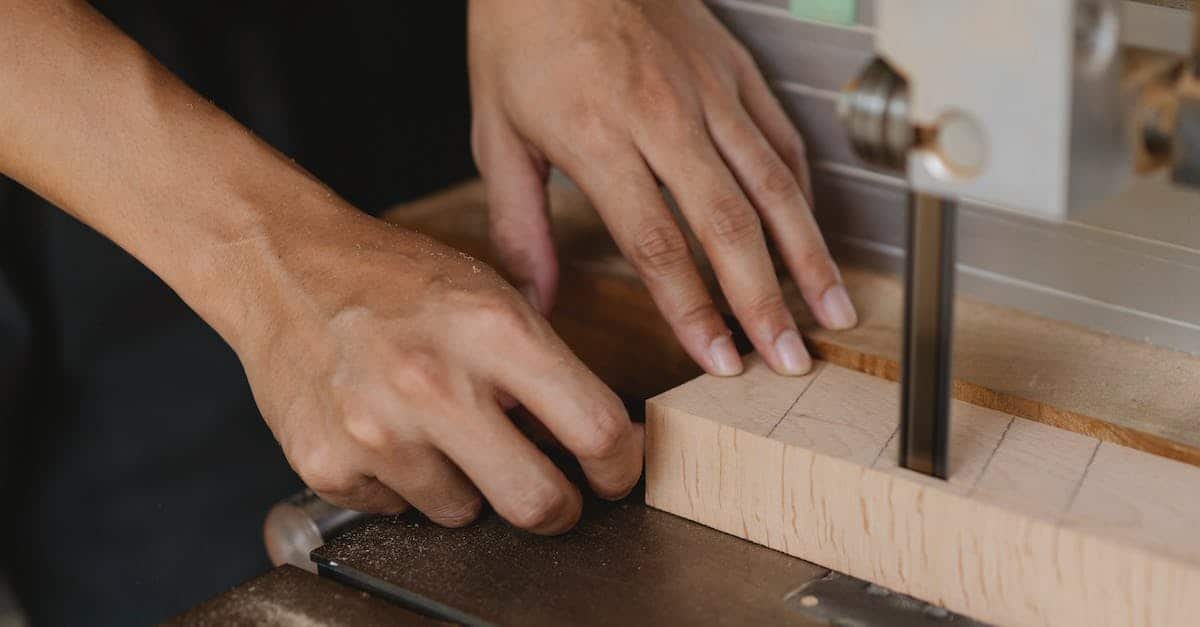Embarking on your woodworking journey is exciting, and having the right tools can make all the difference. Whether you’re crafting a simple shelf or tackling more complex projects, the right equipment sets you up for success.
Starting with the basics ensures you build a solid foundation. From measuring accurately to making clean cuts, each essential tool plays a vital role in bringing your ideas to life. Let’s dive into the ten must-haves every beginner should own to create beautiful and functional pieces with confidence.
Hand Tools
Equipping your workshop with the right hand tools sets the stage for successful projects. These tools offer precision and control essential for every woodworking task.
Hammer
A quality hammer is indispensable for driving nails and assembling pieces. Choose a claw hammer with a comfortable grip and balanced weight, typically between 16 to 20 ounces. The claw feature allows easy nail removal, enhancing versatility in your projects. Opt for a hammer with a smooth face to prevent marring wood surfaces during striking.
Screwdrivers
Screwdrivers provide the precision needed for fastening and adjusting components. Invest in a set that includes both flathead and Phillips-head options to handle various screw types. Look for ergonomically designed handles that reduce hand fatigue during extended use. Magnetic tips are beneficial for holding screws in place, improving efficiency and accuracy in your woodworking tasks.
Power Tools
Enhancing your workshop with power tools increases efficiency and broadens your project possibilities. Investing in essential power tools lays the groundwork for precise and swift woodworking.
Power Drill
A power drill streamlines drilling and driving tasks, making it crucial for any beginner’s toolkit.
- Type: Cordless drills offer mobility, while corded drills provide consistent power.
- Voltage: Opt for at least 12 volts to handle diverse materials.
- Speed Settings: Variable speeds allow for better control over different tasks.
- Chuck Size: A keyless chuck, typically 3/8-inch, facilitates quick bit changes.
- Ergonomics: Ergonomic handles reduce hand fatigue during extended use.
Circular Saw
A circular saw delivers the power needed for straight and accurate cuts in various wood types.
- Blade Diameter: A 7-1/4-inch blade suits most woodworking projects.
- Adjustable Depth: Depth adjustment ensures cutting accuracy across different materials.
- Bevel Capacity: At least a 45-degree bevel allows for angled cuts.
- Safety Features: Look for blade guards and electric brakes to enhance safety.
- Ease of Use: Lightweight models improve maneuverability and reduce user strain.
Other Essential Power Tools
In addition to drills and circular saws, consider these power tools to complete your beginner’s arsenal:
- Jigsaw: Ideal for intricate and curved cuts with adjustable speed controls.
- Orbital Sander: Provides smooth finishes with variable sanding speeds and dust collection.
- Miter Saw: Facilitates precise crosscuts and angled cuts for trim and molding work.
Investing in these power tools equips you to tackle a wide range of woodworking projects with confidence and precision.
Measuring and Marking Tools
Precision in measuring and marking sets the foundation for successful woodworking projects. Equipping your workshop with reliable tools ensures accurate cuts and sturdy assemblies.
Tape Measure
A 25-foot tape measure covers most woodworking needs. Opt for models with a lockable mechanism to secure measurements easily. Choose a steel blade for durability and resistance to bending. Ergonomic cases provide a comfortable grip during extended use.
Level
A 24-inch level guarantees accurate alignment of components. Select levels with magnetic bases for easy attachment to metal surfaces. Vial orientations, such as horizontal and vertical, enhance versatility for different tasks. High-precision markings ensure reliability in your measurements.
Clamps and Workholding
Clamps keep your workpiece steady, ensuring accurate assembly and glue joints. Effective workholding improves the quality and precision of your woodworking projects.
Clamps
Choose clamps that cater to various tasks and materials in your workshop.
| Clamp Type | Size Range | Ideal For |
|---|---|---|
| Bar Clamps | 24″ – 48″ | Large assemblies and glue-ups |
| C-Clamps | 2″ – 12″ | Small pieces and tight spaces |
| Spring Clamps | 6″ – 12″ | Quick, temporary holds |
Invest in these clamp types to handle diverse woodworking projects efficiently.
Safety Equipment
Prioritize safety in your woodworking shop. Equip yourself with essential protective gear to ensure a secure workspace.
Safety Glasses
Protect your eyes from dust, debris, and flying particles by wearing safety glasses. Choose models with impact-resistant lenses and a snug fit to prevent hazards. Opt for glasses with anti-fog coatings and adjustable frames for comfort during long projects.
Ear Protection
Shield your hearing from loud machinery using ear protection like earmuffs or earplugs. Select earmuffs with high noise reduction ratings and cushioned ear cups for comfort. Alternatively, use earplugs designed for woodworking to block harmful noise levels and prevent hearing damage.
Conclusion
Starting your woodworking journey is both exciting and rewarding. With these ten essential tools in your workshop you’re well-equipped to tackle a variety of projects. Each tool plays a crucial role in building your skills and creating beautiful pieces.
Choose quality tools that fit your needs and always prioritize safety. As you gain experience you might find additional tools that enhance your work but these basics set you up for success. Dive into your next project with confidence and enjoy the creativity that woodworking offers.
Frequently Asked Questions
What are the must-have tools for woodworking beginners?
For beginners, essential tools include a quality hammer, a set of screwdrivers (both flathead and Phillips), a power drill, a circular saw, measuring and marking tools like a tape measure and level, various clamps, and basic safety equipment. These tools provide a solid foundation for tackling a wide range of woodworking projects, from simple assemblies to more complex builds, ensuring precision and efficiency in your work.
Why are hand tools important in woodworking?
Hand tools are crucial in woodworking as they offer precision and control that power tools may lack. They allow woodworkers to make detailed adjustments, ensure accurate fitting, and maintain a high level of craftsmanship. Hand tools like hammers and screwdrivers are essential for assembling pieces and performing fine tasks, making them indispensable for both beginners and experienced woodworkers.
What type of hammer is recommended for woodworking?
A claw hammer weighing between 16 to 20 ounces is recommended for woodworking. This type of hammer is ideal for driving nails and assembling pieces, with features that prevent marring wood surfaces. The claw end also assists in removing nails, providing versatility. A quality claw hammer ensures durability and effectiveness, making it a key tool in any woodworking workshop.
Why do I need both flathead and Phillips screwdrivers?
Having both flathead and Phillips screwdrivers is essential for woodworking because they accommodate different types of screws. Flathead screwdrivers are used for screws with a single straight slot, while Phillips screwdrivers fit screws with a cross-shaped slot. This variety ensures you can fasten and adjust components securely and efficiently, enhancing the versatility and functionality of your projects.
How do power tools enhance woodworking projects?
Power tools significantly enhance woodworking projects by increasing efficiency and precision. Tools like power drills and circular saws allow for faster drilling and cutting, enabling woodworkers to tackle more complex projects with ease. Power tools also improve the quality of cuts and assemblies, providing consistency and accuracy that can be challenging to achieve with hand tools alone.
What features should I look for in a power drill?
When choosing a power drill, consider cordless options for greater mobility, variable speed settings for better control, and a comfortable, ergonomic design to reduce hand fatigue. Magnetic tips can enhance efficiency by holding screws in place, and having multiple clutch settings allows for precise torque control. Safety features like automatic shut-off are also important for user protection.
Why is precision important in measuring and marking?
Precision in measuring and marking is foundational for successful woodworking projects. Accurate measurements ensure that pieces fit together correctly, reducing material waste and preventing errors. Reliable marking helps guide cuts and assemblies, enhancing the overall quality and durability of the finished product. Tools like tape measures and levels with high-precision markings are essential for achieving these standards.
What types of clamps are essential in woodworking?
Essential clamps for woodworking include bar clamps for large assemblies, C-clamps for small pieces and tight spaces, and spring clamps for quick, temporary holds. Each type serves a specific purpose, ensuring that workpieces remain steady during assembly and glue drying. Effective clamping improves the quality and precision of your projects, making these tools indispensable in any woodworking workshop.
What safety equipment should every woodworker have?
Every woodworker should have essential safety gear, including safety glasses to protect eyes from dust and debris, earmuffs or earplugs to safeguard hearing from loud machinery, and gloves to protect hands. Additionally, wearing a dust mask can prevent inhalation of fine particles. Prioritizing safety equipment ensures a secure working environment and minimizes the risk of accidents in the workshop.
How do power and hand tools complement each other in woodworking?
Power and hand tools complement each other by combining efficiency with precision. Power tools handle repetitive and large-scale tasks quickly, such as drilling and cutting, while hand tools provide the control needed for detailed work and fine adjustments. This combination allows woodworkers to complete projects more efficiently without sacrificing the quality and accuracy that hand tools offer.




